Poet Laureate
An important part of the Schiller Institute’s mission is to meld the humanistic with the scientific. To address this aspect of our mission, we appointed a Poet Laureate. The first Schiller Poet Laureate is BC undergraduate student Jesse Julian. Jesse has been writing beautiful, thought-provoking poetry that you can explore below. She has also been analyzing poetry in our student-facing newsletter The Scoop.
Climate Is. by Jesse Julian (for the November 12th, 2025 The Scoop Newsletter)

Climate is the situation—sticky; summer skin, sensitive; sunbath, the good kind?; a tropicana trickle tracing the back of your ear, slow and soft as if ready to break bad news in a hesitant whisper, a secret; hush, hush, a rush of river, that wild snake winding amidst all; green. Filled with chlorophyll, overwhelmingly so, so much you wish you could touch the back of each leaf and apologize, like words we say here could come close to closure for discussing this Climate, is that what’s on the news today? Again? Change the channel. Enough of the news, give me something new something micro something small something I can digest I’m hungry for something that doesn’t change, my doomscroll is too doomed today. I’m not down for the downer. Every headline has the word: Cl*mate. Ch*nge it, I flinch when I hear it I can’t say “bad words” I’m wary of censorship is all. The weather or whatever, should that be my biggest concern in this Climate? Is that what you think we’re here to talk about? Or worn-down war-torn worlds under fire, a place of prosperity trickling down to none? Air whispering with pollutants, the inhaler your last chance. Your own backyard, perhaps the grass much greener than the leaving leaves to which you owe an apology/acknowledgment/admittance: Climate is climate every word, every line, every story.
Notes on Climate Is.
COP30 in Brazil, the major global summit negotiating solutions to climate change, marks a major event for environmentalists worldwide—and an especially exciting week for Schiller's delegates attending the conference! This coincides with the continuation of BC's Climate Is Every Story series, where panelists focus on the dire importance of climate journalism. This week in particular discusses climate journalism as local news coverage. I mixed the ideas of these discussions occurring both abroad and on our own campus, starting each stanza like a standout headline with some variant of "Climate is." I address the obstacle of news exhaustion, the proximity of the climate crisis, and the relevance of every story.
ferroptosis by Jesse Julian (for Dr. Whitney Henry's public talk on October 20th, 2025)

ferroptosis (death of the cell) Fear erupts out these firm iron-barred walls, fermenting demands for more and more of my self Ferocious repeatings of I, I, I further question who I am: Fair project for panel scrutiny? Frail organism under microscopic view? I free myself from repetition coined: death of the cell. I, I, I am my own scholar, my own scientist My greatest finding I discovered: myself.
Notes on ferroptosis
The Schiller Institute is excited to host Dr. Whitney Henry as the presenter at our inaugural Casper Augustus Ferguson Seminar!
I chose to focus on imposter syndrome: a feeling of misbelonging, undermining one's skills, or doubt. For minoritized students in the STEM field, this may feel familiar: shrinking under the scrutiny of others, and constantly trying to prove oneself. Dr. Henry has openly spoken about this feeling before on The Story Collider, but her success signifies her ability to persist past the feeling while embracing her truest self.
I play with the phrase, "death of a cell," as both a nod to Dr. Henry's focus on ferroptosis, but the way a "cell" can be a means of restriction. I encourage scholars of all backgrounds to eradicate that which holds them back and pursue their interests with full authority!
parachute by Jesse Julian (for the May 6th, 2025 The Scoop Newsletter)

head down, i fall vertical plunge in frigid nights crystals crunch, each step a memory onto Earth above me, a plastic bag parachute tangled in thin winter arms her withering branch, reaching out asking for freedom. heads up, we spring skin bare in sunkissed mornings young dirt, each step we remember the Earth above me, the plastic bag parachute still tangled now in summer vine her blossoming buds, outgrowing us fighting for freedom.
Notes on parachute
I've been enjoying the final days of the school year, where everyone basks on the quad in newfound sunlight. Witnessing the seasons changing is truly magnificent. Yet on my walk to the train station, a specific tree has a plastic bag entangled in its branches. It's unfortunately out of my reach—trust me, I've tried—yet this bag seems to have stayed there throughout all the changing seasons. For me, this image symbolizes the fight for environmental justice—a tree that continues to grow despite its restraints, and the question of what we can do to save it. I am specifically inspired by this imagery as we watch our graduating seniors depart, who will hopefully continue to carry on a fight for freedom and justice that the Schiller Institute embodies and motivates.
mist by Jesse Julian (for the April 16th, 2025 Schiller Institute Research Symposium)
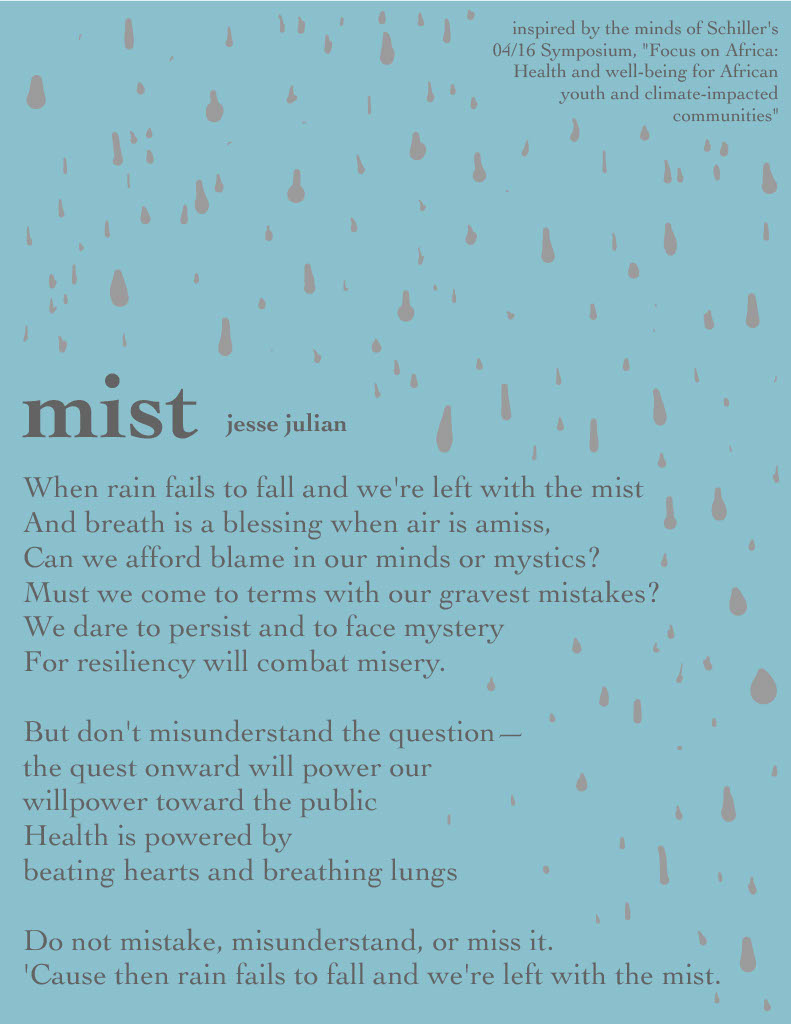
When rain fails to fall and we're left with the mist And breath is a blessing when air is amiss, Can we afford blame in our minds or mystics? Must we come to terms with our gravest mistakes? We dare to persist and to face mystery For resiliency will combat misery. But don't misunderstand the question— the quest onward will power our willpower toward the public Health is powered by beating hearts and breathing lungs Do not mistake, misunderstand, or miss it. 'Cause then rain fails to fall and we're left with the mist.
Notes on mist
We know that we’ve gone terribly astray in the climate crisis if rain doesn’t fall and air is unbreathable. “mist” focuses on the Schiller grantees’ responses to the climate crisis. The grantees do an excellent job highlighting the resilience of community members in African regions. Their research empowers the public to better understand the impact of climate change on their personal well-being, which helps answer the many questions considered when responding to climate change.
Calafia by Jesse Julian (for the April 2nd, 2025 The Scoop Newsletter)

I. i’ve ridden a life of many waves. the journeys in high school, i’ll tell. II. we roamed beaches and hills of gold. wandered far, but always here at home. III. i saw carved names in Calafia cliffs. stories of trespassers past. IV. i felt the moment California changed. warm days now fiery hell. V. burnt brush, bronze air. the dream is a dog, tail tucked. pages smeared with smoke. VI. they trashed the trails with once-lit cigs. “CAUTION” tape blocks gold dandelions. VII. i’ve written my life in ocean waves. the tale i keep chasing to tell.
Notes on Calafia
“Calafia” is a haiku series inspired by our poetry workshop happening this Earth Day! On April 22nd from 3–6 PM, the Schiller Institute and the Writing Center will host this collaboration in celebration of Green Week. I decided to answer both of our upcoming prompts, which addresses personal climate stories and emotion-evoking images. I capture the influence of Calafia beach on my climate story, in which I highlight the dangers of human impact on the environment. I invite all those interested in sharing their climate stories to participate in this upcoming workshop!
i land by Jesse Julian (for the March 12th, 2025 The Scoop Newsletter)
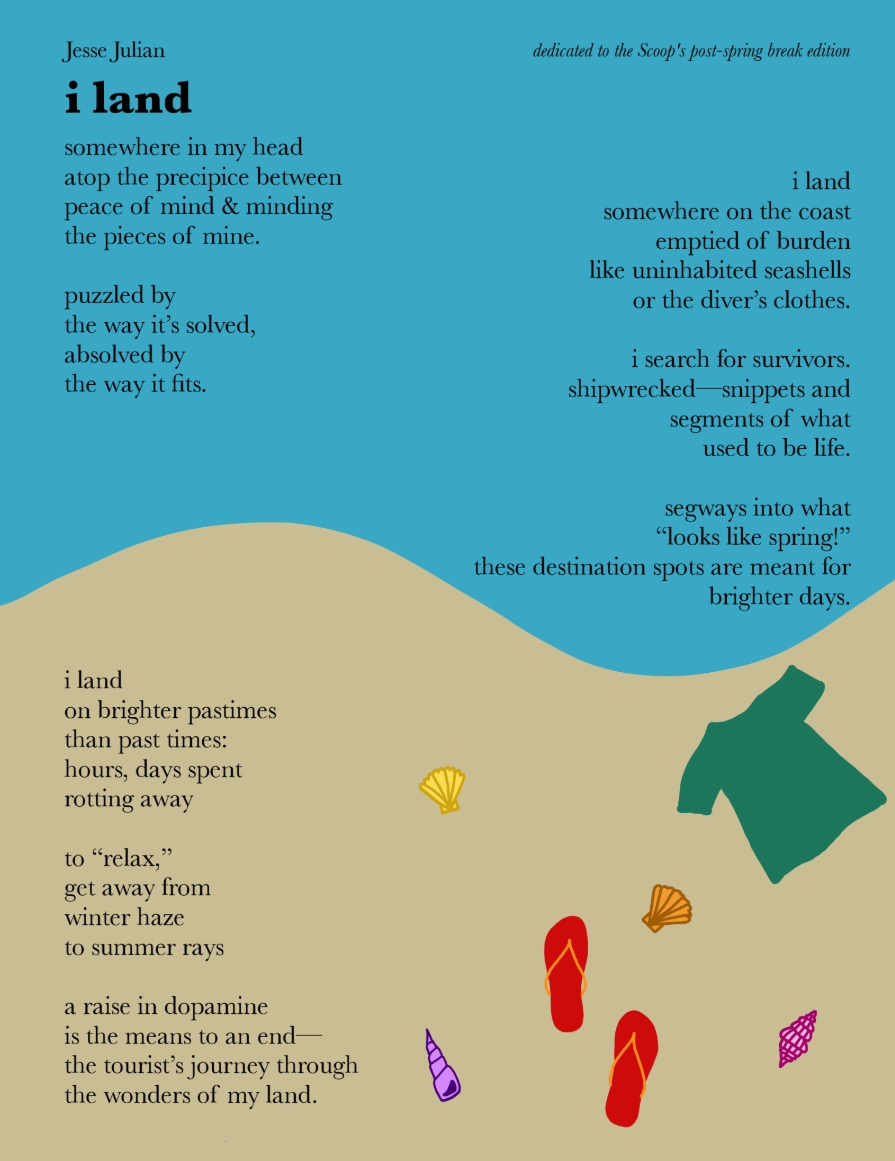
i land somewhere in my head atop the precipice between peace of mind & minding the pieces of mine. puzzled by the way it’s solved, absolved by the way it fits. i land somewhere on the coast emptied of burden like uninhabited seashells or the diver’s clothes. i search for survivors. shipwrecked—snippets and segments of what used to be life. segways into what “looks like spring!” these destination spots are meant for brighter days. i land on brighter pastimes than past times: hours, days spent rotting away to “relax,” get away from winter haze to summer rays a raise in dopamine is the means to an end— the tourist’s journey through the wonders of my land.
Notes on i land
I landed on a rather introspective route when writing “i land” (a play-on-words for “island”). My other works often utilize resources and information derived from faculty. However, I wanted to focus on the topic of mental health, and how it heals (or doesn’t) during a break from school, work, etc. It would’ve been ironic to refer to academia when I felt this reflection come from within me. I examine topics such as the difference of seasons in affecting dopamine levels, the isolating feeling of metacognitive meditation, and the means to which we “relax.” Although spring break is often seen as a surface-level vacation, it also carries implications regarding our view on relaxation.
A Time Capsule Holds Our Grief by Jesse Julian (for the February 4th, 2025 The Scoop Newsletter)
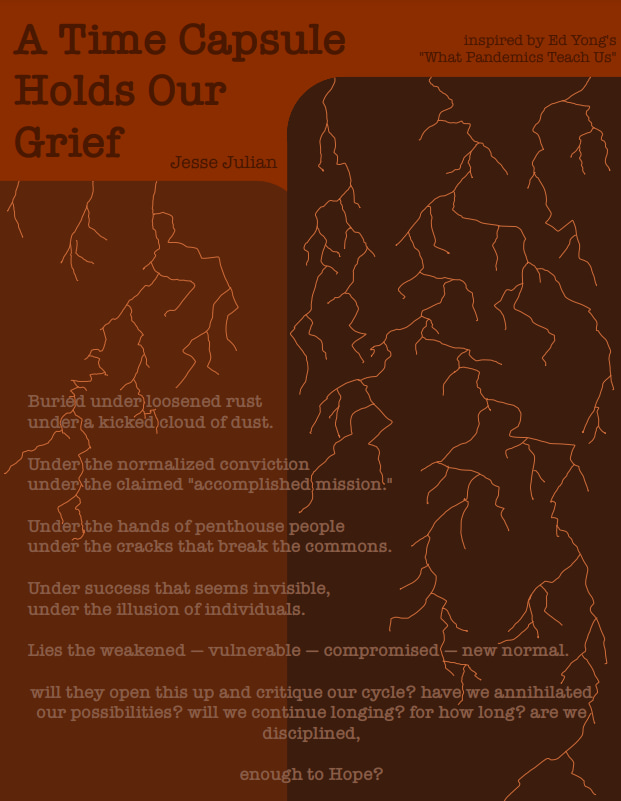
Buried under loosened rust under a kicked cloud of dust. Under the normalized conviction under the claimed "accomplished mission." Under the hands of penthouse people under the cracks that break the commons. Under sucess that seems invisible, under the illusion of individuals. Lies the weakened - vulnerable - compromised - new normal. ill they open this up and critique our cycle? have we annihilated our possibilities? will we continue longing? for how long? are we disciplined, enough to Hope?
Notes on A Time Capsule Holds Our Grief
An acclaimed journalist during the COVID pandemic, Ed Yong did a wonderful job highlighting the multitude of reasons COVID played out the way it did, ranging from public attitudes to public health efforts. A major takeaway, however, is that it's not quite over—not for marginalized communities, the underrepresented, the chronically ill, etc. Yong pushes us to escape the ant mill by recognizing and repairing the cracks in the system. My poem, “A Time Capsule Holds Our Grief,” utilizes repeated phrases reminiscent of epitaphs and the extended metaphor of burial and a time capsule to emphasize some of the failures and questions that humanity is left with following the pandemic. - Jesse Julian
pilot:poet::poet:pilot by Jesse Julian (for the December 12th, 2024 The Scoop Newsletter)
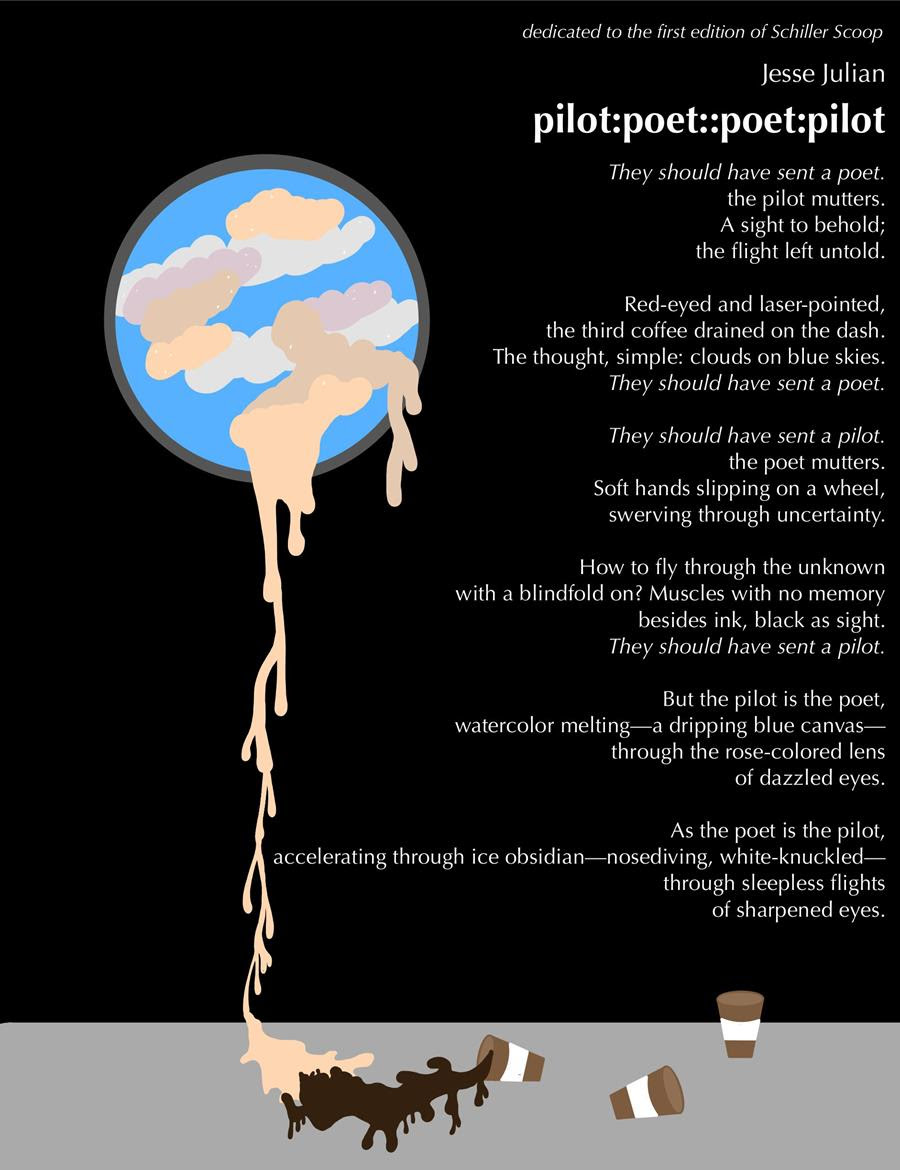
They should have sent a poet. The pilot mutters. A sight to behold; the flight left untold. Red-eyed and laser-pointed, the third coffee drained on the dash. The thought, simple: clouds on the blue skies. They should have sent a poet. They should have sent a pilot. The poet mutters. Soft hands slipping on a wheel, swerving through uncertainty. How to fly through the unknown with a blindfold on? Muscles with no memory besides ink, black as sight. They should have sent a pilot. But the pilot is the poet, watercolor melting - a dripping blue canvas - through the rose-colored lens of dazzled eyes. As the poet is the pilot, accelerating through ice obsidian - nosediving, white-knuckled - through sleepless flights of sharpened eyes.
Notes on pilot:poet::poet:pilot
My poem (read aloud as “pilot is to poet as poet is to pilot”) reflects on my role. I thought of this one movie quote: an astronaut in Contact is launched into space, looks outside the ship, and utters, ‘They should have sent a poet.’ The indescribable beauty of science is difficult to convey, yet the humanities offers a relatable, down-to-earth perspective. In this ‘pilot’ edition of the newsletter, I draw attention to the similarities between the pilot/scientist/engineer/researcher, and the poet—both complementing each other in their work. - Jesse Julian
ripe by Jesse Julian (read at the October 3, 2024 Schiller Abroad event)

"I saw my life branching out before me like the green fig tree in the story. From the tip of every branch, like a fat purple fig, a wonderful future beckoned and winked." — Sylvia Plath, The Bell Jar i ponder at the tree which branches before me, ripe with curiosity, yearning to feel my own arms stick out at jagged bends, grasp onto the blessings born out of growth. i wish my ideas were as organic; sustained; serene; sacred. yet if i root myself to the dense soil, i'd refuse to branch beyond my stubborn trunk my thoughts and ideas will all remain a shrunken seedling and inaction becomes my wrinkled sin. i must take that leap of faith and pursue what i have dreamt of, my long limbs spiraling with infinite direction; my height sprouting to the open sky; winking at the saplings ripening & ripening. yet i still ponder at the tree which branches before me, ripe with curiosity, breathing through leaves i've grown i sway my voice through the wind i wait for that whisper back— it is not celebrating a cure, or answering an ailment but it soothes me a careful gust comforting me a future nurtured with questions rooted within us.
Notes on ripe
In attempting to embody the uniqueness of Schiller Abroad through poetry, I had the wonderful opportunity to speak with Munachi Onyiuke. Munachi is a current senior who participated in the first Working For and With Communities, an innovative, project-based course that sends students on an immersive trip. In Cambodia, Munachi worked with JRS on sustainable farming solutions, sharing information back and forth in a collaborative manner.
Our conversation led me to this idea of growth. When thinking about the future, how do we decide on the direction we want to take? Sylvia Plath’s fig tree metaphor came to mind, illustrating a ripened future waiting for our grasp. “ripe” places the narrator not below the tree but figuratively as the tree. The imagery of a tree also came from Munachi’s special experiences with a “blessing the tree” ceremony from the religious community in Cambodia. I wanted to capture this wholesome preciousness.
I emphasized Munachi’s point regarding their focus. The goal of the course was not to cure or resolve a problem but rather to be curious and willing to learn. It was about taking that leap of faith towards a future that might not be so clear. Growth and curiosity are sacred characteristics we should all venture to have. So, ask those questions and explore beyond the scope of your mind. -- Jesse Julian
Astronomical by Jesse Julian (read at the September 24th, 2024 Schiller Institute welcome reception for new faculty)
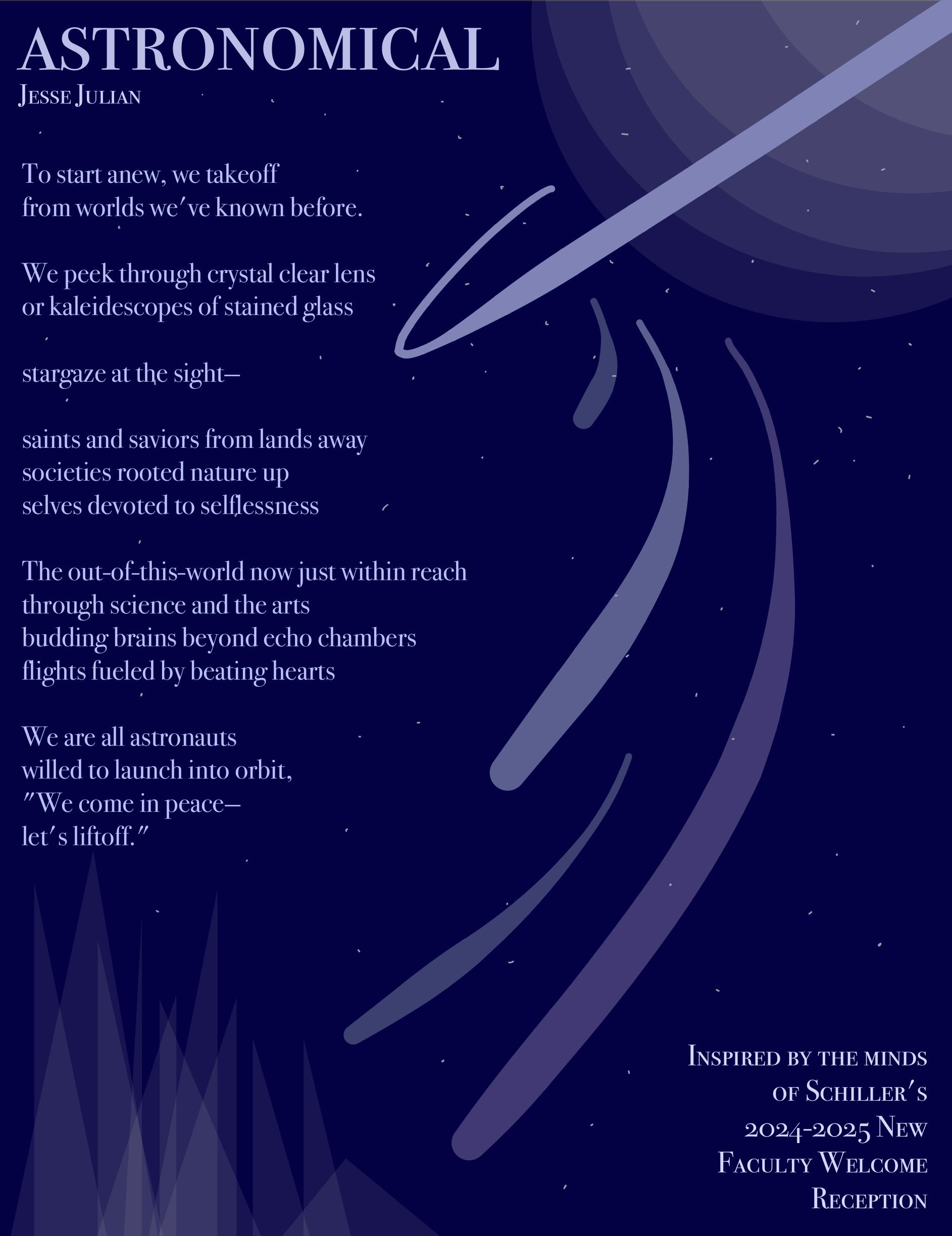
To start anew, we takeoff from worlds we've known before. We peek through crystal clear lens or kaleidescopes of stained glass stargaze at the sight— saints and saviors from lands away societies rooted nature up selves devoted to selflessness The out-of-this-world now just within reach through science and the arts budding brains beyond echo chambers flights fueled by beating hearts We are all astronauts willed to launch into orbit, "We come in peace— let's liftoff."
Notes on Astronomical
The big question I try to answer is, what does it mean to start anew? It means to continue forward while remembering the past, to take inspiration from what came before. I spoke with new faculty members to try to gather information about what starting new positions felt like. It feels like the start of a new voyage, informed by previous experiences and motives close to the heart.
I spoke with Director Mary Murphy about the political relationship between Ireland and the US, and I reference the Irish Hall windows in Gasson as a nod to this. Her role emphasizes the contemporary political connections that Ireland has with BC and beyond. Her institute ventures into a post-conflict conversation, addressing themes such as reconciliation and public policy implementation.
I then spoke with Professor Justin Henriques, who brought to light the wonderful student work occurring with international communities in the Human-Centered Engineering Program, students whom he referred to as “budding engineers.” The program is fueled by the selfless work of students dedicated to service.
I finally spoke to Professor Jesse Swann-Quinn regarding his teaching position at BC. His class, Ecologies of Power, excites him because of the amount of student engagement put into examining the intersection between power and the environment. These stories drive politics, impacting our society—which reminds us that society is rooted in nature.
Cheers to the astronomical accomplishments of the new faculty, who are working together to lift BC up beyond the echo chambers of academia and into real-world progress!
hourglass by Jesse Julian (read at the December, 1 2023 Research Symposium)
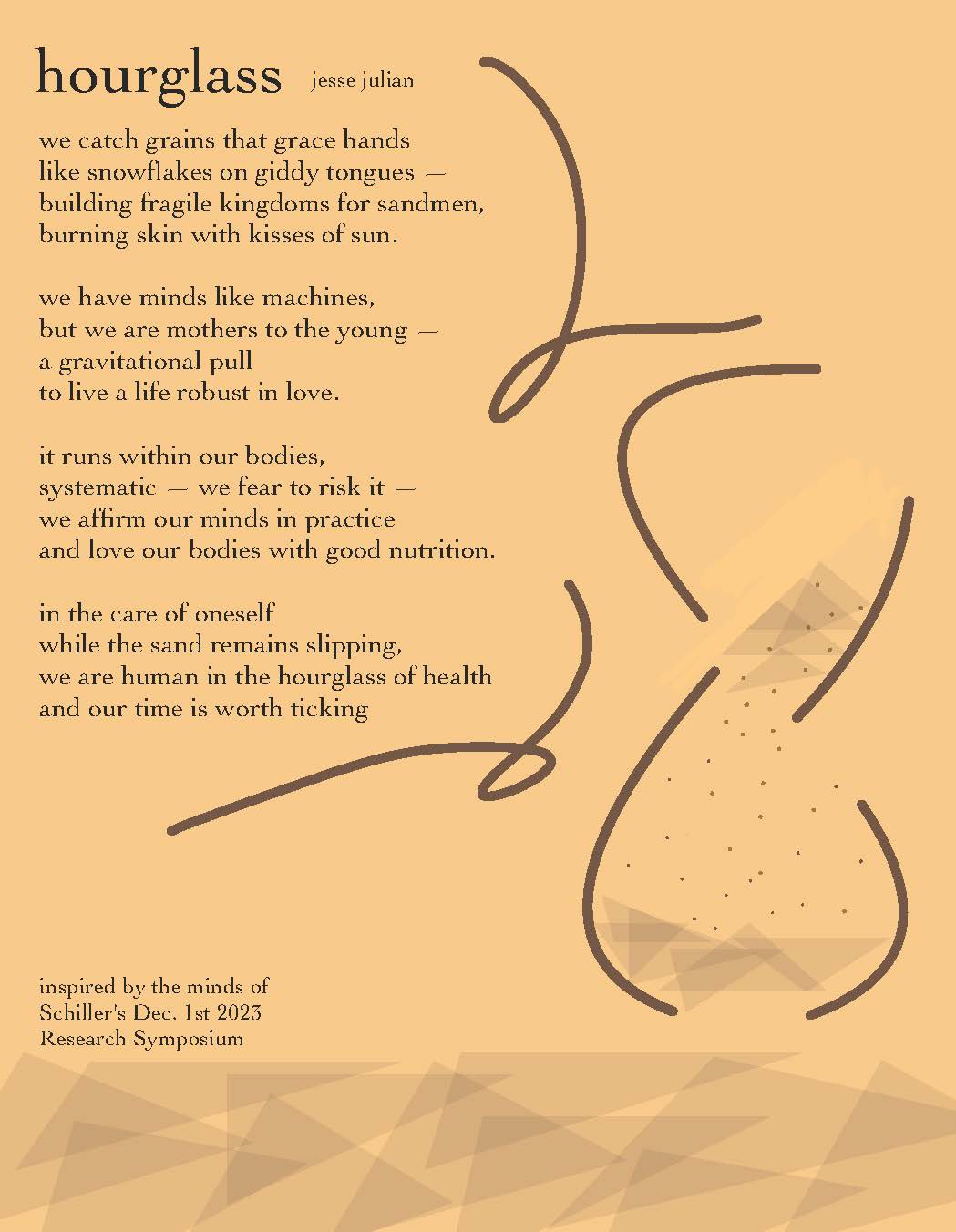
Hourglass. We catch grains that grace hands, like snowflakes on griddy tongues, building fragile kingdoms for sandmen, burning skin with kisses of sun. We have minds like machines, burt we are mothers to the young, a gravitational pull, to live a life robust in love. It runs within our bodies, systematic we fear to risk it, we affirm our minds in practice and love our bodies with good nutrition. In the care of oneself, while the sand remains slipping, we are human in the hourglass of health, and our time is worth ticking.
Notes on Hourglass
Sonnets often sing of strong emotions, most popularized by Shakespeare. With a structure and rhyme scheme reminiscent of a sonnet, "hourglass" focuses on intense human love and joy in the face of a finite life. Whether you are a dreamer or a mental machine, a mother or an adolescent, your health and well-being greatly impact the quality of your life. We as humans aim to live healthy lives filled with love despite the hours ticking towards finitude. The health-based research in this symposium aims for a similar feat: improving the everyday lives of people and creating a healthcare system centered on humans.
Catalysis by Jesse Julian (read at the November 6, 2023 Research Symposia)
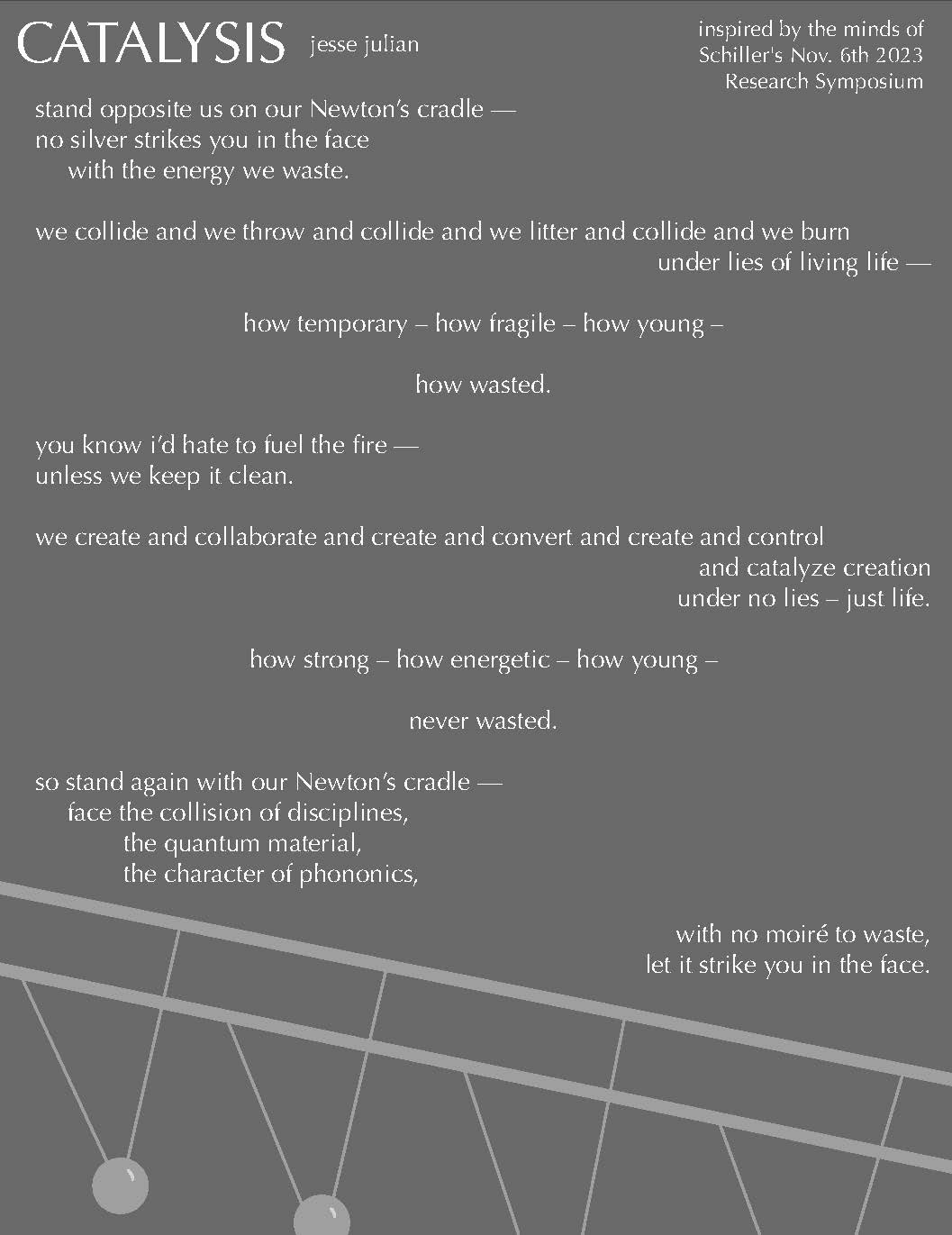
Catalysis, stand opposite us on our Newton's cradle, no silver strikes you in the face, with the energy we waste. We collide and we throw and collide and we litter and collide and we burn, under lies of living life, how temporary how fragile how young how wasted. You know I'd hate to fuel the fire, unless we keep it clean. We create and collaborate and create and convert and create and control and catalyze creation under no lies just life. How strong how energetic how young never wasted. So stand again with Newton's cradle, face the collision of disciplines, the qquantum material, the character of phononics, with no moire to waste, let it strike you in the face.
Notes on Catalysis
Whether you’re a quantum physicist or a curious kid, you’re likely familiar with Newton’s cradle. It often sits still on desks until you initiate motion by grabbing one of the silver balls and allowing it to fall, and all the spheres continue to collide in a cradle-like motion until energy is lost to its surroundings. Under this metaphor, humans hope to maintain the optimistic and progressive energy of the universe, yet environmental concerns such as heat waste or harmful carbon emissions enact the waste of our developing technology and science. However, the back-and-forth collision of ideas through collaboration across multiple disciplines, all present within this symposium, helps in catalyzing the creation of a sustainable society.
once upon a time by Jesse Julian (read at the October 18, 2023 Research Symposia)
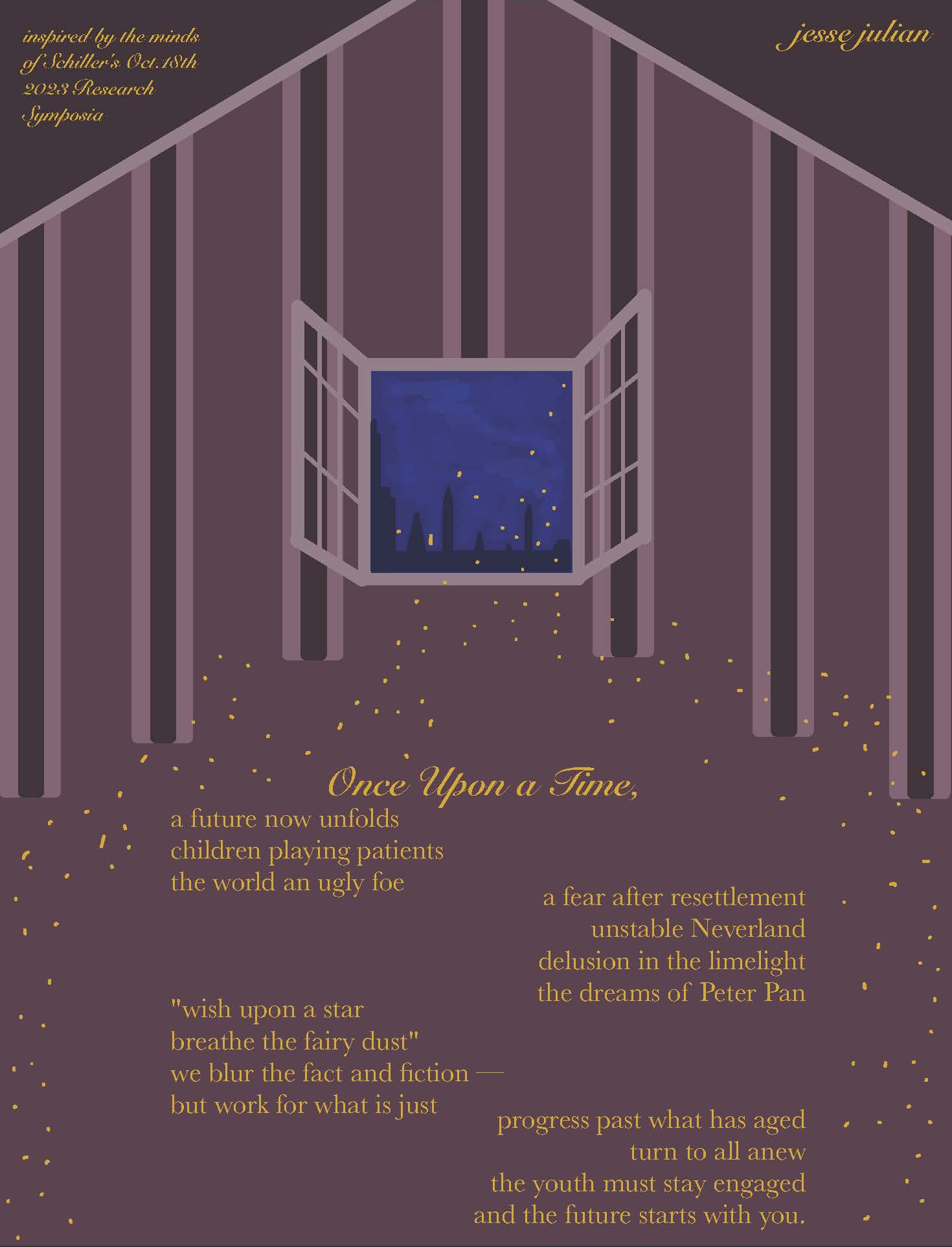
Once Upon a Time, a future unfolds, children playing patients, the world an ugly foe, a fear after resettlement, unstable Neverland, delusion in the limelight, the dreams of Peter Pan, "wish upon a star breath the fair dust," we blur the fact and fiction, but work for what is just, progress past what has aged, turn to all anew, the youth must stay engaged, and the future starts with you.
Notes on once upon a time
"once upon a time" came from a reflection on youth well-being, which appeared as a running theme in today's symposia. Although we may only dream that our children could live in a fairy tale, they are challenged with prevalent topics such as mental health and immigration. However, the research done by the Schiller grantees aims to resolve and investigate these areas of concern, propelling us toward a better reality for our youth.
the human touch by Jesse Julian (read at the April 27, 2023 Lunch and Learn Seminar)

conflict clouds and it compounds a viscous mind — it melts, it melts newly born, children's mental health but humanity — a warm wash of sunlight, hold hearts in sticky summer skin — it spills over, a home for healthy habit sustained in a child's heart, it beats: "Sugira-" Strengthen "-Muryango" the Family reach within culture skills and support miles from our residence for warm smiles and intelligence.
Notes on the human touch
"the human touch" focuses on the warm, comforting feeling associated with the good in humanity. My poem begins by acknowledging the compounded effect of conflict (such as war), which negatively impacts a child's malleable cognitive skills and intelligence. Yet, I believe all humans harness a warmth, encompassed in their ability to reach and touch the hearts of those in need. Upon meeting them, Matias and Sarah embodied their compassionate dedication to implementation science, bringing skills, support, and the warmth of the human touch to children.
Modern Magic by Jesse Julian
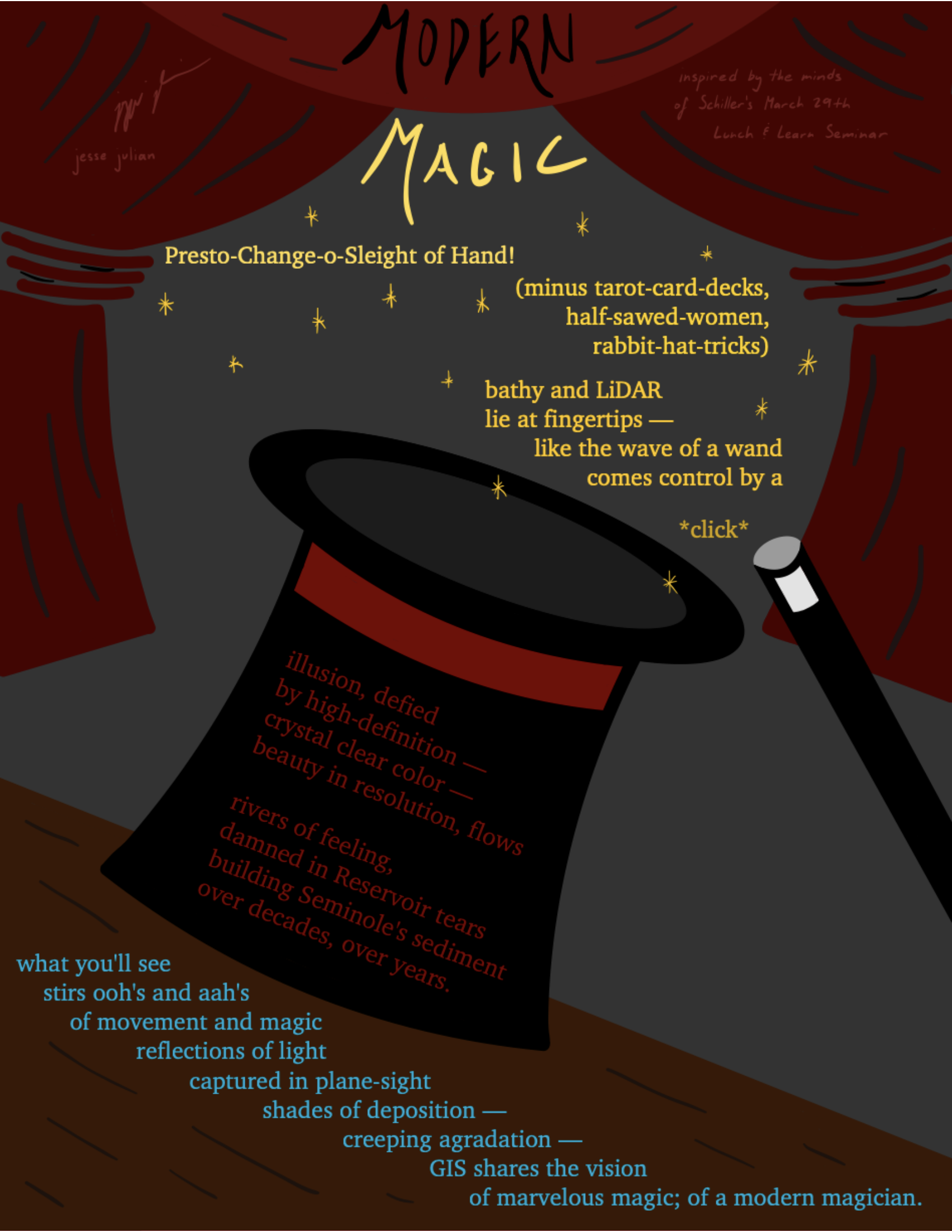
Modern Magic Presto-Change-o-Sleight of Hand! (minus tarot-card-decks, half-sawed-women, rabbit-hat-tricks) bathy and LiDAR lie at fingertips - like the wave of a wand Comes control by a *click* what you’ll see stirs ooh’s and aah’s of movement and magic reflections of light captured in plane-sight shades of deposition - GIS shares the vision of marvelous, of a modern magician. Image: contains an artful magician’s hat, wand and stars
Notes on Modern Magic
"Modern Magic" struck me while admiring the fluid and mesmerizing complexity of GIS. I sat in Professor Noah Snyder's lab, admiring the captivating visuals on the screen while his welcoming team discussed the depictions. They displayed an aura of exciting wonder, especially regarding the capabilities of GIS in developing their research.
As a theme, I toyed with the idea of traditional magic. I incorporated references to this language domain; for instance, the phrase "Presto Chango" alludes to the "quick change" of modern technology today.
I understand, though, that magic shows appear somewhat corny, like a kids' birthday party. GIS, in contrast, was sophisticated, told a factual story, and relied on technological advances, so I defined the difference between traditional and modern magic.
Each layer of the Chattahoochee River was revealed with a satisfying click of a mouse, captured by bathymetry and LiDAR. The ease of this captured my attention, and I felt like a kid watching a card trick — except GIS isn't an illusion at all.
15 by Jesse Julian (read at the January 26, 2023, SI-GECS Symposium)
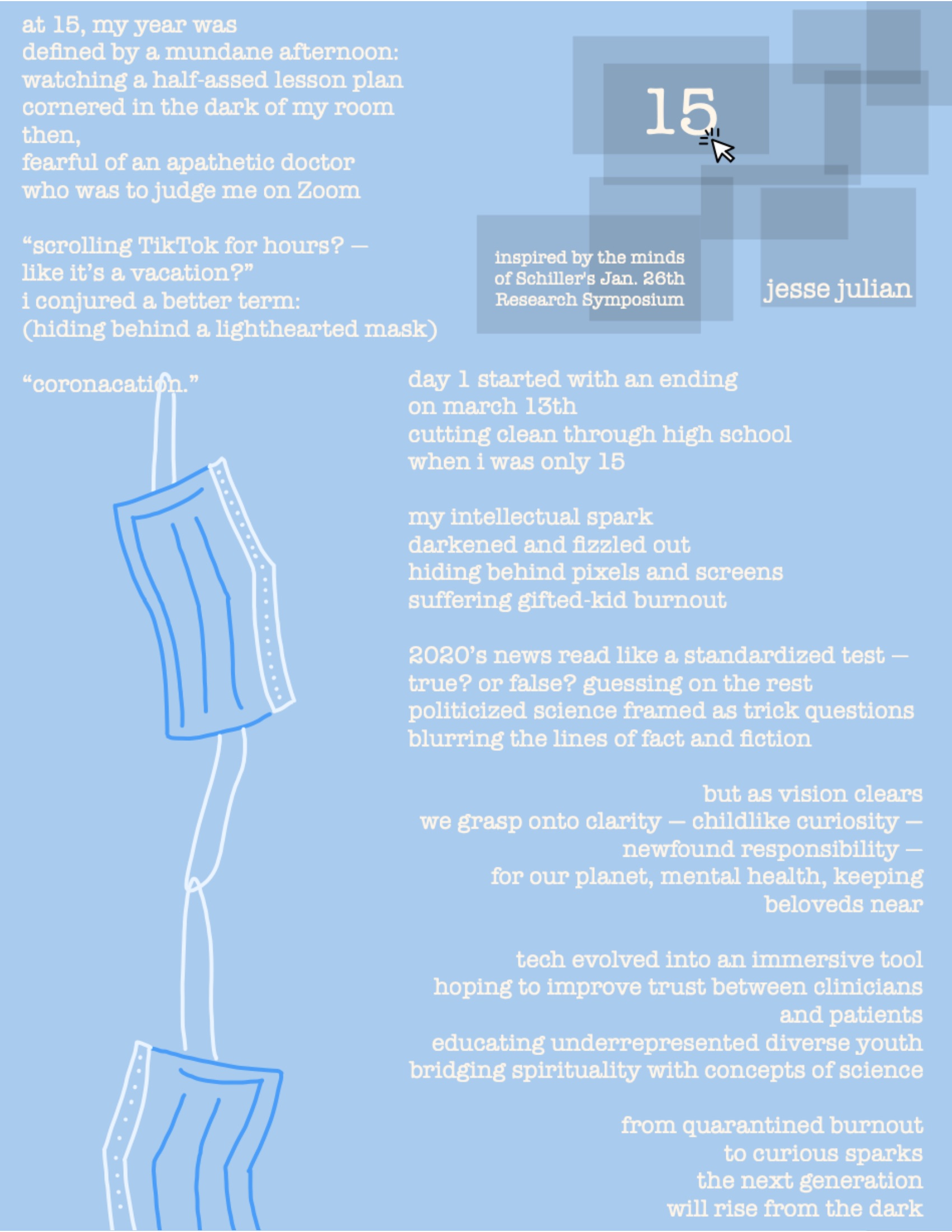
at 15, my year was defined by a mundane afternoon: watching a half-assed lesson plan cornered in the dark of my room then, fearful of an apathetic doctor who was to judge me on Zoom "scrolling TikTok for hours? -- like it's a vacation?" I conjured a better term: (hiding behind a lighthearted mask) "coronacation." day 1 started with an ending on march 13th cutting clean through high school when I was only 15 my intellectual spark darkened and fizzled out hiding behind pixels and screens suffering gifted-kid burnout 2020's news read like a standardized test -- true? or false? guessing on the rest politicized science framed as trick questions blurring the lines of fact and fiction but as vision clears we grasp onto clarity -- childlike curiosity -- newfound responsibility -- for our planet, mental health, keeping beloveds near tech evolved into an immersive tool hoping to improve trust between clinicians and patients educating underrepresented youth bridging spirituality with concepts of science from quarantined burnout to curious sparks the next generation will rise from the dark -- 15, jesse julian, inspired by the minds of Schiller's Jan. 26th Research Symposium
Notes on 15
"'15' describes the personal impact on my life from the COVID-19 pandemic, which struck right through the middle of my high school career. It changed the way I interacted with people, the way I learned, and how I found entertainment. Adapting to an Internet-based life was a struggle, especially for my mental health. A decline in mental health was a common adolescent issue among my peers; I wanted to reflect this in my poem. However, the research performed by Jan. 26th’s symposia brings comfort to this younger generation, which will eventually rise from the dark of the pandemic and return to their curious sparks, thanks to the effort made by researchers today." - Jesse Julian
trailblazing by Jesse Julian (read at the January 19, 2023 SI-GECS Symposium)
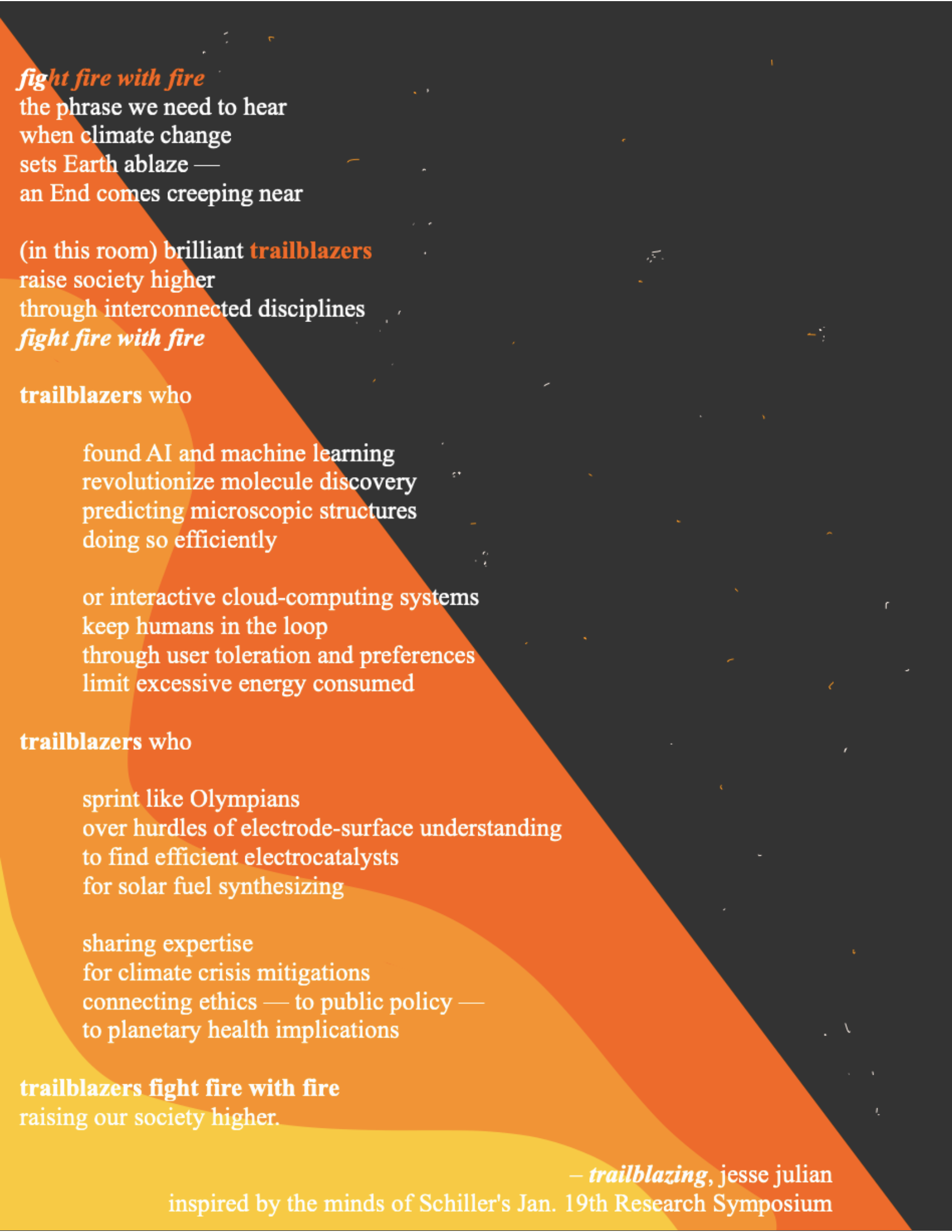
fight fire with fire the phrase we need to hear when climate change sets Earth ablaze ---- an End comes creeping near (in this room) brilliant trailblazers raise society higher through interconnected disciplines fight fire with fire trailblazers who found AI and machine learning revolutionize molecule discovery predicting microscopic structures doing so efficiently or interactive cloud-computing systems keep humans in the loop through user toleration and preferences limit excessive energy consumed trailblazers who sprint like Olympians over hurdles of electrode-surface understanding to find efficient electrocatalysts for solar fuel synthesizing sharing expertise for climate crisis mitigations connecting ethics --- to public policy --- to planetary health implcations trailblazers fight fire with fire raising our society higher. --trailblazing, jesse julian inspired by the minds of Schiller's Jan. 19th Research Symposium
Notes on trailblazing
Growing up, I was a passive child, refusing to take action regarding any issues surrounding me. I was often advised not to “fight fire with fire,” which essentially means to respond to an attack with a similar attack. However, I transformed this saying into a much more uplifting and motivating phrase, provoking people to take action. My poem characterizes January 19th's researchers as “trailblazers” who took profound action against climate change. This is proven by their commitment to their respective research. Thus, I devoted a stanza to each of their projects, after studying and asking them about their work. “trailblazing” commemorates the ways in which these “trailblazers” have chosen to fight climate change, or, “fight fire with fire.” - Jesse Julian

